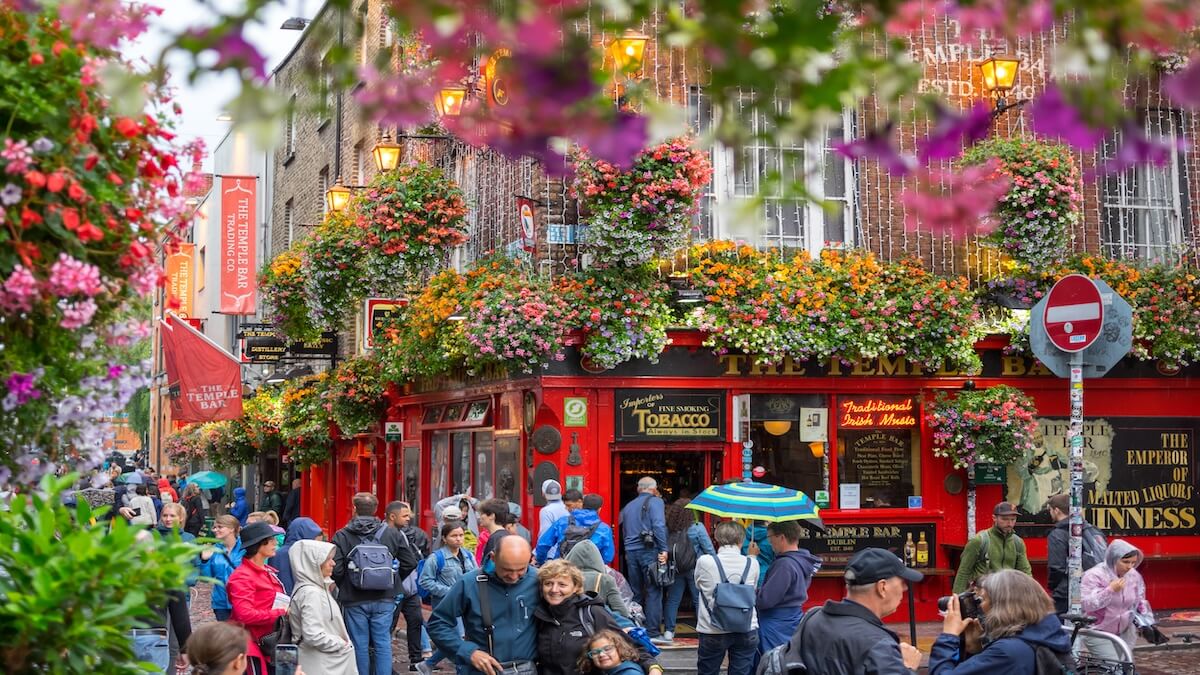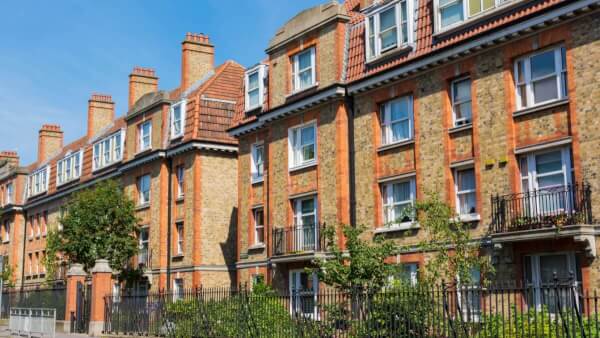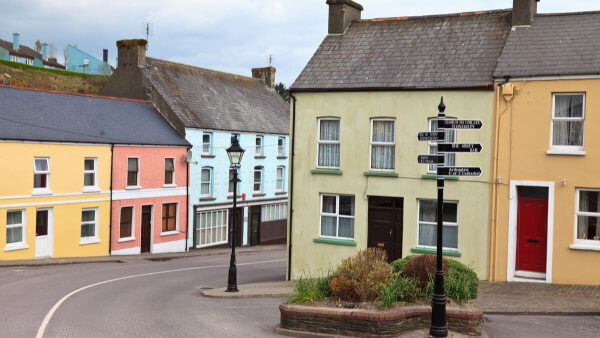How to buy land in Ireland as an American
Interested in buying land in Ireland? Here’s everything you need to know about buying a plot of land abroad as an American.

Trading the Statue of Liberty for the Cliffs of Moher comes with more than a change in scenery. Moving to Ireland from the USA means navigating different visa rules, budgeting for a new cost of living, and adapting to the way everyday life in Ireland works.
This guide covers what you need to know before you go, from finding the right visa to settling into your first home.
We'll also introduce Wise — your international money transfer alternative. Use Wise to send stress-free transfers to over 140 countries - all at the standard mid-market exchange rate.
| Table of contents |
|---|
Before you start planning the move, it helps to get familiar with the essentials. Ireland is small in size but rich in culture and opportunities for new arrivals.
| Capital | Dublin |
|---|---|
| Population | 5.3 million¹ |
| Currency | Euro (EUR) |
| Languages | Irish (Gaeilge) and English |
| Time zone | Greenwich Mean Time (GMT) / Irish Standard Time (IST) |
| Government | Parliamentary democracy |
| Weather | Mild and often wet, with cool summers and relatively warm winters |
| US tax treaty | Yes² |
From the bustling streets of Dublin to the quiet charm of rural villages, Ireland offers a mix of modern living and centuries-old traditions.
The quick facts above will give you a starting point, but the rest of this guide covers everything from visa options to where you might want to live.
Americans can enter Ireland without a visa for short stays of up to 90 days.³ However, if you plan to live, work, or study in Ireland for an extended period, you will need to apply for the correct visa or residence permit before you arrive. The type of visa you need will depend on the reason for your move.
Here are the most common options for Americans moving to Ireland.⁴
If you have a confirmed job offer in Ireland, you can apply for a long-stay (D) employment visa. Before applying, you must first secure an employment permit from the Department of Enterprise, Trade, and Employment.
There are several types of permits available, including:
The employment visa allows you to live and work in Ireland for the duration of your employment permit. Many permit holders may also be eligible to bring family members to Ireland after a set period.
If you plan to study in Ireland for longer than 3 months, you will need a long-stay (D) study visa.
To qualify, you must:
Students are typically granted a Stamp 2 immigration permission, which allows for part-time work (up to 20 hours per week during term time and 40 hours per week during holidays) while studying.⁵
If you’re an American moving to Ireland to join a close family member, you may be eligible for a Join Family visa.
To qualify, your family member must be:
The exact requirements depend on your relationship to the family member and their status in Ireland. You will need to show evidence of your relationship and that your family member meets the financial requirements to support you.
If you’re financially self-sufficient and want to retire in Ireland, you can apply for a retirement visa.
Applicants must show:
A retirement visa does not allow you to work in Ireland, but if you're considered an ordinary resident, you may qualify for public healthcare.
If you’re in a long-term, marriage-like relationship with an Irish citizen or legal resident, you may be able to apply for a De facto partnership visa.
Applicants must:
Once approved, you’ll be able to live in Ireland with your partner and, in many cases, work without a separate employment permit.
If you’re moving to Ireland to volunteer, you can apply for a Volunteer visa. This visa is generally granted for up to 1 year at a time, with a maximum stay of 2 years.
You must have:
If you’ve lived in Ireland legally for 5 years, you may be eligible to apply for long-term residence.⁶
Citizenship is typically available after 5 years of continuous residence, although time spent on certain short-term visas may not count toward this total. Applicants for citizenship must also meet residency, good character, and integration requirements.
Ireland is known for its high living costs, especially in its major cities, but many expats feel the trade-off is worth it for the standard of living and vibrant culture.
Prices can shift depending on your lifestyle and where you choose to settle, but having a clear idea of everyday expenses will help you budget more accurately before making the move.
Here’s an overview of some common costs:
| Expense | Approximate Cost⁷ |
|---|---|
| Meal at an inexpensive restaurant | €18 (~21 USD) |
| Three-course meal for two (mid-range) | €80 (~93 USD) |
| Apartment (1 bed) in the city center | €1,593 (~1850 USD) |
| Apartment (3 bed) in the city center | €2,647 (~3074 USD) |
| Basic (electricity, heating, etc.) | €140–366 (~163–425 USD) |
| Monthly phone plan | €14–35 (~16–41 USD) |
| Internet | €35–65 (~41–75 USD) |
On average, a single person’s monthly expenses (excluding rent) come in at around 1,162 USD. Housing will be the largest cost for most people, but other factors like eating out, commuting, and utilities also add up quickly.
Groceries are generally in line with Western European prices, though imported goods can be significantly more expensive.
Public transportation is often more cost-effective than owning a car, as insurance, fuel, and road tax can be costly. Entertainment and dining can range from budget-friendly to high-end depending on your choices.
For families, public schools are free, but those opting for international education should plan for annual fees that can reach €15,900–€24,000 per child.⁸
Opening a bank account in Ireland will make it easier to manage rent and everyday expenses. While some banks let you start the process online, most require an in-person visit to complete your application.
Common account options include current accounts for daily transactions and savings accounts if you want to set money aside.
Major banks in Ireland include:
To open an account, you’ll usually need:
Some banks may allow new arrivals to use proof of address from their home country temporarily, but you’ll need to update this once you have an Irish address.
Most accounts are free for students, but standard current accounts can have monthly fees or transaction charges.
Ireland taxes residents on their worldwide income, meaning you’ll need to declare both Irish and foreign earnings. Non-residents are only taxed on income earned within Ireland.
As a US citizen, you’ll also have tax obligations back home. The US taxes its citizens on worldwide income, even if they live abroad, so you must continue filing annual returns with the IRS. You may also need to report foreign bank accounts under FBAR rules if your total foreign balances exceed $10,000 at any point during the year.⁹
The US and Ireland have a tax treaty designed to help avoid double taxation. You may be able to use the Foreign Earned Income Exclusion, Foreign Tax Credit, or other treaty benefits to reduce your US tax bill.
Because the rules can be complex, it’s best to get advice from both US and Irish tax professionals before or soon after you move.
Housing in Ireland will probably be one of your largest monthly expenses.
The market offers everything from modern city apartments to traditional cottages in rural towns, but demand is high in urban areas, so it’s important to start your search early and set a realistic budget.
Many newcomers choose a short-term rental first. This gives you time to explore different neighborhoods, arrange any necessary paperwork, and decide where you want to settle.
For both short-term and long-term rentals, it helps to start your search online and be ready to apply as soon as you find a property you like. In popular cities, good rentals can be taken within days.
Some popular sites for finding rentals in Ireland include:
You’ll usually need to provide proof of income, photo ID, and references from a previous landlord or employer. A security deposit equal to one month’s rent is common.
Here’s a snapshot of average monthly rent in central locations:
| City | 1 bedroom | 3 bedroom |
|---|---|---|
| Dublin¹⁰ | €2,044 (~2,375 USD) | €3,556 (~4,130 USD) |
| Cork¹¹ | €1,579 (~1,834 USD) | €2,825 (~3,281 USD) |
| Galway¹² | €1,800 (~2,091 USD) | €2,936 (~3,410 USD) |
While Dublin is the most expensive place to rent, cities like Cork and Galway can offer better value without sacrificing amenities. Smaller towns and rural areas are generally more affordable, but you may need to factor in longer commute times.
Always make sure you have a written rental agreement. This should clearly state the rent, deposit amount, payment schedule, and any other terms to avoid misunderstandings later.
Ireland’s healthcare system is a mix of public services. Public healthcare is funded mainly through general taxation and managed by the Health Service Executive.
Residents can access a wide range of essential medical services through the public system, often at low cost or free of charge, depending on their income and eligibility.
Americans moving to Ireland with a residence permit can apply for a Personal Public Service number, which allows them to register for public healthcare. Depending on your circumstances, you may qualify for a Medical Card or GP Visit Card, which cover certain services at no cost.
Private healthcare is also widely available in Ireland and is often used to reduce wait times or access a broader choice of specialists and facilities. Many residents use a combination of public and private care, with private insurance helping to cover hospital stays and specialist appointments.
Employers may offer private health insurance as part of a benefits package, which can be valuable for faster access to certain treatments.
Here’s a quick overview of healthcare costs in Ireland:¹³
| Service | Approximate |
|---|---|
| GP consultation | €50–70 (~58–81 USD) |
| Prescription medications (no Medical Card) | Up to €80/month (capped by Drugs Payment Scheme) (~93 USD) |
| Prescription with medical card | €1.50 per item (max €15/month) (~1.75 / 17.50 USD) |
| Inpatient public hospital stay | €80 per day (€800/year) (~93 / 930 USD) |
| Accident & Emergency (A&E) visit | €100 (waived with GP referral or Medical Card) (~116 USD) |
If you’re staying long-term, registering for public healthcare is important to keep your costs manageable. Without access to the public system, you would need to rely solely on private services or comprehensive health insurance.
Ireland offers everything from vibrant capitals to smaller cities with a more laid-back pace. Your ideal location will depend on your career plans, budget, and the lifestyle you want.
Below are some of the most popular choices among expats, each with its own blend of culture and quality of life.
As Ireland’s capital and largest city, Dublin is the center for business and global connections. Expats benefit from a wide range of English-speaking services, strong opportunities in tech and finance, and a lively social scene. The cost of living is higher than elsewhere, but the mix of cultural attractions and coastal charm makes it a top choice for many professionals and families.
Known as Ireland’s “second city,” Cork offers a strong sense of community and a thriving food and culture scene. It’s home to major employers in pharmaceuticals and manufacturing, making it attractive for skilled professionals. The cost of living is lower than in Dublin, and the riverside setting and countryside access give it a relaxed pace with urban conveniences.
Famous for its arts and easy-going lifestyle, Galway is a smaller city with a big cultural presence. It’s popular with expats who value walkable streets and quick access to the Wild Atlantic Way. While job opportunities are fewer than in Dublin or Cork, Galway draws those in the creative industries and education. Its festivals and pub scene make it appealing for a balanced, community-focused lifestyle.
Ireland is considered one of the safer countries to live in, with crime rates lower than those of many European nations. Most issues are minor, such as pickpocketing in busy areas or nightlife districts. Staying alert will go a long way.
If you need emergency assistance, you can call 112 or 999 from any phone, free of charge. Both numbers connect you to police, fire, or medical services.
Police are generally approachable and responsive, and rural towns are especially low-crime. In larger cities like Dublin or Cork, taking the same precautions you would anywhere else is usually enough.
For most expats, safety concerns are minimal, allowing you to focus on enjoying life in Ireland.
Ireland combines the comfort of an English-speaking country with the excitement of living abroad. You get the advantages of a modern economy and quick links to the rest of Europe.
Add in the scenery and famously friendly locals, and it’s easy to see why so many expats choose to stay.
Success comes down to preparation. Get your paperwork sorted, understand the healthcare and tax systems, and budget realistically. Once the essentials are covered, you can focus on making the most of life in Ireland.
| Wise can help you get a better deal on currency conversion. You can convert over 40 currencies at the standard mid-market exchange rate, and we'll show you the fees upfront so you know exactly how much you're paying. |
|---|
Get a Wise Account
in minutes 💰
Sources
Sources checked 09/12/2025
*Please see terms of use and product availability for your region or visit Wise fees and pricing for the most up to date pricing and fee information.
This publication is provided for general information purposes and does not constitute legal, tax or other professional advice from Wise Payments Limited or its subsidiaries and its affiliates, and it is not intended as a substitute for obtaining advice from a financial advisor or any other professional.
We make no representations, warranties or guarantees, whether expressed or implied, that the content in the publication is accurate, complete or up to date.

Interested in buying land in Ireland? Here’s everything you need to know about buying a plot of land abroad as an American.

Thinking about moving to Ireland? Find out what you need to know about renting in Ireland in this guide.

Thinking about buying property in Europe? Your best bet might be Ireland. Learn everything about buying property in Ireland right here.

Ireland is known for its love of food and drink, picturesque countryside and bustling cities. Read on to find out the pros and cons of living in Ireland.

Child maintenance in Ireland is complicated — read on to learn what you need to know.

Having a baby is a priceless experience, but if you’re a foreigner in a different country, it can be daunting to navigate new healthcare systems and impending...